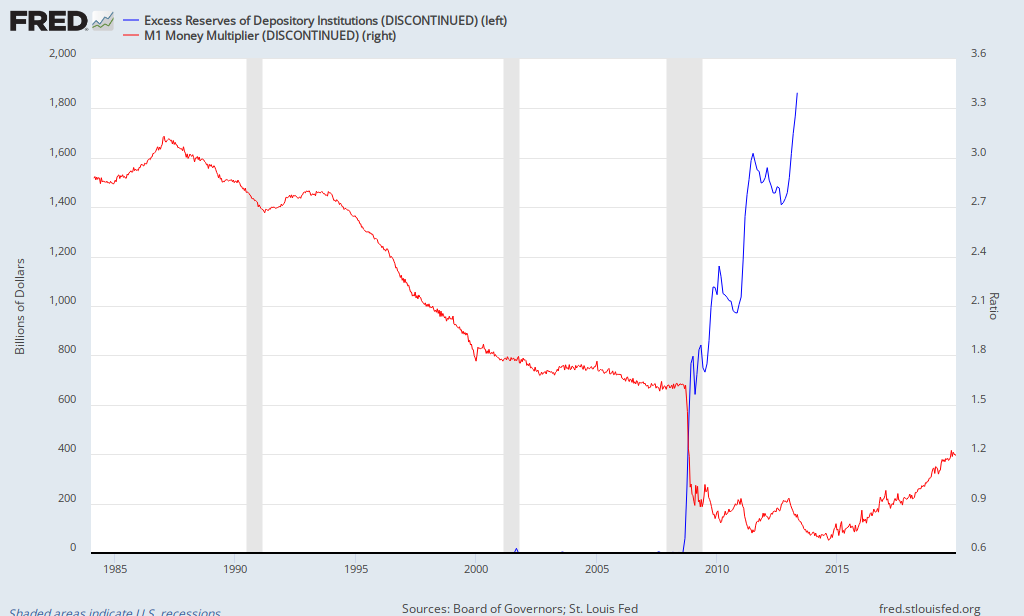Re: Another Recession?
Thats not true at all.
Since the creation of the fed, the average time span between recessions as gotten longer, and the average length of recessions has gotten shorter. During the 1800's, we frequently had multiple recessions during ever decade, many of which more or less ran into each other, with litterally only a few months of recovery in between.
Like take a look at this:
1836–1838 recession
late 1839–late 1843 recession
1845–late 1846 recession
1847–48 recession
1853–54 recession
Panic of 1857
1860–61 recession
1865–67 recession
1869–70 recession
Panic of 1873 and the Long Depression Oct 1873 –Mar 1879
1882–85 recession
1887–88 recession
1890–91 recession
Panic of 1893
Panic of 1896
1899–1900 recession
1902–04 recession
Panic of 1907
Panic of 1910–1911
Recession of 1913–1914
From 1865 to 1914, pick any random date, and most likely we were in a recession.
List of recessions in the United States - Wikipedia, the free encyclopedia
You're going to stake everything on a Wiki link? Keep in mind we had some form of central banking from our founding thru 1833, and the economy was hardly straight line. I don't have the time or inclination to delve deeply into every year that was listed, but lets look at a few.
The 1836 recession was a leftover of the Second Bank's monetary inflation.
1845-1846:
This recession was mild enough that it may have only been a slowdown in the growth cycle.
So not sure if it was a recession but add it to the list just in case. :roll:
1853-1854:
With the exception of falling business investment there is little evidence of contraction in this period
Once again, add it to the list just in case.
Panic of 1857:
By winter's end the pressure for money had abated, liquidation happened very fast. A very mild recession that barely rates the list.
1860–61 :
...the data generally show a contraction occurred in this period, but it was quite mild. :yawn:
The Long Depression:
Why is this even on the list? During this time there was a very large expansion of industry, railroads, general output, net national product, real per capita income, real national product growth of 6.8% per year, 4.5% rise per year in real product per capita. The alleged monetary contraction was a myth because the money supply increased 2.7% per year. If this is depression, thank you sir may I have another.
The reason for the myth was because prices in general fell the whole period. For any number of reasons, a lot of economists believe deflation is always a bad thing and signals recession. Ain't necessarily so. When government/banking systems do not increase the money supply "fast" enough, the free market will result in an increase of economic growth and production so great that it swamps the money supply increases and prices fall. By the end of this "depression", the average consumer was considerably better off than before. This held true in the US, Germany, France, and Italy.
The list is so full of holes I'm having a hard time taking it seriously. A whole century of despair? That would explain why we failed to progress economically. Oh, wait... I would imagine that if similar criteria were used, a list could be made for the years after 1929. Assuming the list is valid, the longest depressions were five and a half years and four years, and most were under 2 years. Compare that to the Great Depression and our current sluggish economy that is supposedly in recovery, both long and drawn out after Fed intervention. As for the "recessions", economic cycles are not at all unusual and will always occur with or without a central bank. The Keynesian's go-to man, Paul Krugman, said:
Recessions are common; depressions are rare. As far as I can tell, there were only two eras in economic history that were widely described as “depressions” at the time: the years of deflation and instability that followed the Panic of 1873 and the years of mass unemployment that followed the financial crisis of 1929-31.
Neither the Long Depression of the 19th century nor the Great Depression of the 20th was an era of nonstop decline — on the contrary, both included periods when the economy grew. But these episodes of improvement were never enough to undo the damage from the initial slump, and were followed by relapses.

 Let's stay on topic, folks.
Let's stay on topic, folks.